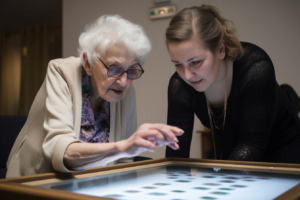
Sensory stimulation can work wonders for people living with dementia, helping to reduce agitation, improve mood, and encourage social interaction. There are a large variety of engaging activities that tap into the senses to keep things purposeful and enjoyable.
Music to Their Ears:
Music has a unique ability to evoke emotions and memories. Create a personalized playlist for your loved one, featuring their favorite tunes from the good ol’ days. Whether it’s dancing to Elvis or crooning along with Frank Sinatra, music can provide a soundtrack for laughter and connection.
A Feast for the Eyes:
Art therapy can be both relaxing and stimulating. Gather some art supplies, or better yet, try the Art Studio or Merlin Image Generator on RememberStuff and let your loved one’s imagination run wild! Whether they create a masterpiece or a gloriously messy finger painting, the process itself can be a joyful and therapeutic experience.
A Taste of Nostalgia:
Whip up some of your loved one’s favorite dishes or try your hand at recreating a treasured family recipe. The familiar tastes and aromas can transport them back in time, and you might even uncover some long-forgotten culinary secrets (like grandma’s mysterious “pinch of something” ingredient).
A Touch of Comfort:
Sensory blankets or fidget toys can provide tactile stimulation and help reduce agitation. You can even create a DIY sensory blanket by attaching various textured materials, such as ribbons, buttons, or zippers. Just be prepared for the occasional surprise when you accidentally sit on a strategically placed button or Zipper!
The Scent of Memory:
Aromatherapy can have a powerful impact on mood and cognition. Experiment with different essential oils, such as lavender for relaxation or peppermint for alertness. You can also recreate the comforting scents of home by baking cookies or brewing a pot of coffee, filling the air with olfactory delights.
A Stroll Down Memory Lane:
Reminiscence therapy can help evoke positive memories and stimulate conversation. Create a memory box filled with photographs, postcards, or sentimental objects that represent significant moments in your loved one’s life. Who knows, you might even discover that your mild-mannered grandpa was once a daring motorbike enthusiast!
Laughter Yoga:
Laughter is a universal language and a powerful sensory stimulant. Participate in laughter yoga, a practice that combines deep breathing, stretching, and laughter exercises, to boost mood and stimulate the senses. Warning: contagious laughter and aching cheek muscles may ensue.
Engaging in sensory stimulation activities can improve the quality of life for people with dementia, while also providing opportunities for laughter and connection. By incorporating a variety of sensory experiences, you can create a rich and enjoyable environment that supports your loved one’s well-being.